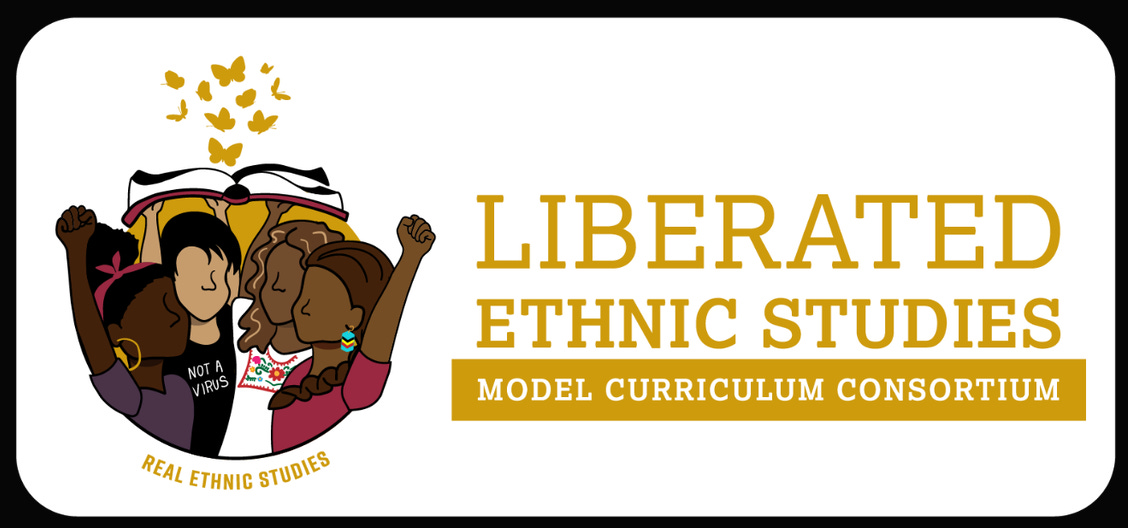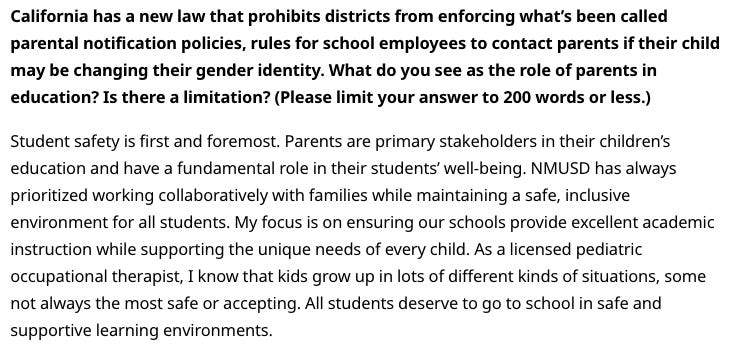Rethinking Ethnic Studies; plus, Newport-Mesa Special Election Update
We can teach the experiences of nonwhite people in the United States without Ethnic Studies; plus, the OC Register candidate questionnaires are out!
Earlier this month, Governor Newsom unveiled his revised 2025-2026 state budget update, which is expected to become law in June. The updated budget made headlines for an expected $12 billion deficit and the governor’s plan to partially cut Medicaid coverage for immigrants without legal status. However, next year’s budget is noteworthy for another reason: a continued lack of funding for the state’s floundering Ethnic Studies mandate, which has an estimated $276 million yearly pricetag (based on a 2021 estimate)!
As we have discussed here previously, the Ethnic Studies mandate, which would require districts to offer the course to high schoolers and add it as a graduation requirement, is only effective if the state appropriates funds to local education agencies for developing and offering the course. Without state funding, neither the requirement to offer the course nor the graduation requirement would be in effect.
The continued lack of funding for Ethnic Studies provides California with an opportunity to rethink its approach to this topic. Instead of requiring a separate, expensive course, the state could weave lessons on the experiences of nonwhite individuals into existing courses such as history, literature, and political science. In this way, schools could deliver the benefits of Ethnic Studies curriculum without the budgetary strain, controversy, and political baggage that come with the course.
PLUS: the OC Register candidate questionnaires are out. Andrea McElroy provided answers consistent with her prior statements, while her opponent, Kirstin Walsh, gave a non-responsive answer to a question regarding withholding medical/mental health information from parents to hide her support for such policies.
Teaching accurate, complete courses inclusive of all ethnic groups should be a priority. However, we don’t need the politics, divisiveness, and opportunity costs inherent in an Ethnic Studies mandate to achieve this goal.
I. Ethnic Studies is steeped in far-left politics, divisive, and unnecessary.
In addition to the $276 million yearly costs associated with creating a whole new high school course—which the state is apparently unwilling or unable to provide—there are several downsides of mandating this course:
Political Indoctrination: Ethnic Studies has always been political. The field traces its roots to Black Power/Third World Liberation Front student protests at California university campuses in the late 1960s demanding a course focused on them. (Model Curriculum, pp. 10-12.) The course was developed by and for university-level students, and has generally been taught from a far-left political point of view. (Id., at p. 14.) Critical Race Theory is a key theoretical framework, defined as:
a practice of interrogating race and racism in society. [Critical Race Theory] recognizes that race is not biologically real but is socially constructed and socially significant. It acknowledges that racism is embedded within systems and institutions that replicate racial inequality—codified in law, embedded in structures, and woven into public policy.
(id., at p. 45, fn. 12.) The field grapples with “power structures” and “forms of oppression” and promotes political activism by civil unrest, protest, and even violent confrontation. (Id., at pp. 9-10.)
Accordingly, Ethnic Studies is an inherently political, far-left course of study with activism and resistance against “power structures” and “oppression” at its core. The course would force feed Critical Race Theory to every high schooler in California. Our state should not be mandating political ideology like this at the high school level.
No clear definition: Compounding the political indoctrination issue, there is no clear, agreed-upon standard for what the course must include. (See Educ. Code, § 51225.3.) Instead, local schools can develop their own curriculum or adopt an existing one.
This lack of consensus has created an opening for groups like the Liberated Ethnic Studies Model Curriculum Consortium to promote university-style, politically driven Ethnic Studies content to local schools. One “Liberated” lesson explicitly normalizes and justifies violence to achieve political ends, requiring that students:
contextualize the hypervisible individual acts of violent resistance within a larger system of institutionalized/invisibilized quotidian/banal violence. In other words, we don’t ask whether violence was “justified” or not.
We ask what political analysis/ideology/positionality/lived
experience led to this act of resistance?
What political analysis do you have of our current world,
is there anything that troubles you?
What acts of resistance will it lead you to change the
world?
What would it take for you to “swim against the cultural
current of our time”
(Liberated Ethnic Studies Model Curriculum Consortium lesson plan, p. 9.)
Under California law, local schools are free to adopt this university-level version of Ethnic Studies. However, even if schools adopt a toned-down version of the curriculum, an individual teacher could still exercise her discretion and introduce “Liberated” concepts in the classroom.
Lack of clear standards has made implementing the mandate more difficult and opened the door to “Liberated” curriculum seeping into our high schools.
Divisiveness: It should come as no surprise that requiring far-left coursework which teaches that America is systemically racist, divides the population into oppressors and victims, and glorifies activism and even violence to achieve political goals has met with controversy. The debate over implementing the Ethnic Studies mandate has played out in school board meetings and lawsuits up and down the state.
Earlier this year, major Jewish organizations won significant concessions from Santa Ana Unified, which purposely violated California open meeting laws to craft an anti-Semitic curriculum. An external curriculum consultant equated Israel with “settler colonialism” and used social media to promote anti-Semitic tropes. Officials on Santa Ana Unified’s curriculum steering committee said that “Jews are the oppressors,” called Jewish organizations “racist,” and refused to acknowledge Hamas was a terrorist organization post-Oct. 7. As a result of the lawsuit, the steering committee was disbanded, Ethnic Studies courses were pulled, and the district agreed to redesign the curriculum in compliance with open meeting laws.
Even when there hasn’t been a lawsuit, the divisive nature of this subject matter has preoccupied school boards statewide.
Opportunity Cost: Lastly, this ill-conceived mandate would require students to take a controversial class with questionable academic benefits instead of proven courses like accounting, world history, economics, etc. California students, ultimately, are the ones who would suffer lost opportunities to take classes of their choice.
II. The benefits of Ethnic Studies can be achieved without the extra baggage.
Proponents of Ethnic Studies generally cite two rationales for the mandate. First, they tout the course as “as an inclusive, objective examination of the history, culture and contributions of various ethnic groups in the state.” Second, proponents claim that the course reduces dropout rates and enhances student outcomes. However, the academic studies supporting this second claim have come under fire, with many contending the evidence does not support diverting students from proven courses such as world history into a mandated Ethnic Studies course.
There is nothing wrong with an objective examination of the experiences of nonwhite groups in California. I support this aim—our students benefit from accurate and complete courses that include this information. However, we do not need an expensive, divisive course steeped in politics to get this done. We can simply beef up our existing offerings to make sure they are accurate and complete.
Conclusion
Given all the complications, California should abandon its ill-conceived Ethnic Studies mandate. Students can learn about various ethnic groups with accurate, complete lessons in other subjects. While Ethnic Studies may work at the university level or as an elective, it is a failure as a mandate.
Newport-Mesa Special Election Update: OC Register Candidate Questionnaires Released!
Over the weekend, the OC Register released candidate questionnaires from the two candidates in the Newport-Mesa Trustee Area 5 special election, Andrea McElroy (here) and her opponent, Kirstin Walsh (here).
The questionnaires are notable for two things. First, McElroy’s questionnaire is consistent with her priorities and campaign messaging. While McElroy has said she would follow applicable law, she has been clear that she does not support any policies requiring the withholding of information from parents. She is straightforward about what she believes and how she will perform when elected.
On the other hand, Walsh performed a classic flip-flop on the issue of schools withholding information from parents. In her 1/19/25 questionnaire submitted to the Newport-Mesa school board, Walsh unreseverdly agreed with policies restricting certain information from parents. She said she agrees “with the safety act AB1955 [sic]” and that it “could be a detriment to a child if an educator was required to report the current way a child would like to be identified.”
When the OC Register asked her the same question in the heat of the campaign, Walsh offered . . . a nonresponsive answer inconsistent with her prior unreserved support:
Where McElroy has been consistent, Walsh has not. First, Walsh falsely claimed to be independent and nonpartisan while Democratic politicians have run her campaign, lined up left-leaning funding sources, and publicly endorsed her. Now, she has attempted to cover up her prior support for information withholding policies with this OC Register word salad. So far, Walsh has made two false or inconsistent claims in this campaign.
As a prosecutor, Walsh’s prevarication calls to mind a jury instruction I’ve heard numerous times. Before closing arguments, the judge will tell the jurors that a witness’s false or inconsistent statements can be grounds for not believing anything the witness says (among other factors). Unfortunately, that same logic applies here.
If Walsh cannot be honest about her partisanship and support for withholding information from parents, why should we believe her about anything else?










